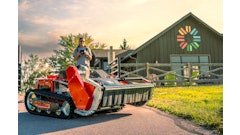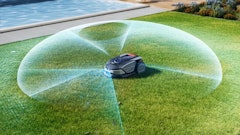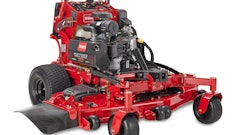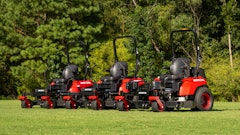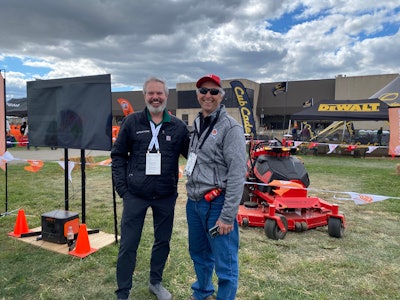
Neal Lackritz, senior director responsible for advanced technology for AriensCo. and Charles Brian Quinn, co-founder and CEO of Greenzie, discuss the role of autonomy in today's green industry.
Green Industry Pros: What all are you showcasing today at Equip Expo?
Lackritz: A year ago, we started a new technology group for the company (AriensCo.), and that's my team. We're interested in looking at how we can advance things like autonomy, safety, telematics systems, where we can bring technology to the market and start to differentiate. As you know, one of the big areas that everyone's interested is autonomy. We wanted to put together a prototype of what we think might be a good concept for landscapers. We reached out to Greenzie earlier this year and started a discussion because they've got a really sophisticated software stack. We wanted to couple that with our mowers and hardware stack. The conversation always comes back to, how is it that we can make landscapers as productive as possible? Let's say a landscaper normally shows up at a jobsite with two people. What's going to happen is one's mowing and one's doing trimming and weeding or something like that. The way this mower works is you show up at the jobsite, and one operator will jump out and will mow the perimeter of the site. At that point, while the mower is busy striping, they can be working on other things. The analogy I like is if you paint a room, someone has to do the details and put the initial trim in, but then someone comes along with a roller. This is the roller. We're seeing people basically doubling, or nearly doubling, their productivity. Where I needed two guys, it's now one, so that company can now start bidding more jobs. This saves labor cost, but more importantly, they can generate more revenue because they can also bid out more jobs.
So, this is a prototype, and we're judging interest. The feedback so far has been positive. We're thinking of introducing this as a limited pilot in 2025. We've already had a bunch of municipalities approach us. One of the things you'll notice about this unit, which is also particularly nice, is we decided to start off on an electric vehicle. It's running right now in the background.
Green Industry Pros: How has the software in autonomy evolved over the years?
Quinn: In terms of the software, it's been evolving. It's been getting better and safer, more productive, more reliable. There are all kinds of little tricks that our landscapers tell us. So, for instance, one of them told us that at the end of the time, it should alert (the user) when it's done. What's great is our software updates automatically. So, the next week, it sends you a little alert, 'hey, I'm done.' This year, we added things like record and repeat. In terms of the software and autonomy, it's come a long way. It's getting more awesome as the hardware costs have come down and the software gets better and better. That's technology for you.
Green Industry Pros: What are the intended applications for a mower like this?
Lackritz: The best applications that we're finding for autonomous mowing are when you have lots of large acreage to do, so think a university that has sports fields. Another favorite is airports, where you've got these taxiways. In general, from a landscaper's perspective, that's not really high-margin work. They want to work on the trim and adding in the hardscape. This enables them to get that part of the job done and then focus on the higher-margin stuff, which is really nice. If you're trying to use this mower for a little walkway, it's not worth it. Don't bother.
We're imagining this where a landscaper shows up to the dealer and buys a new mower that has the autonomy hardware installed on it. They start showing up at the site and use it. What's really nice about these devices is they remember where you've mowed before, so the first time you go, you have to mow that perimeter. The second time you show up, it knows. You can literally just open up the app and say, 'I want to change the striping pattern,' and all that happens.
Quinn: There's a long list of stuff that America maintains, but it's industrial, it's manufacturing, it's plants, it's hospitals, it's facilities, it's fairgrounds. The stuff we all use, and it has to be mowed.


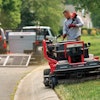

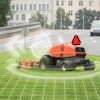
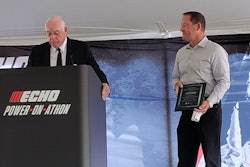
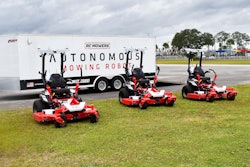
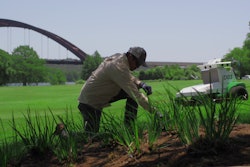




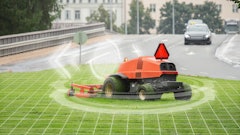
![Gravely Pro Turn Mach One My23 Dsc03139 Edit 1200x800 5b2df79[1]](https://img.greenindustrypros.com/mindful/acbm/workspaces/default/uploads/2025/10/gravely-pro-turn-mach-one-my23-dsc03139-edit-1200x800-5b2df791.BucBnDoN22.jpg?ar=16%3A9&auto=format%2Ccompress&fit=crop&h=135&q=70&w=240)
